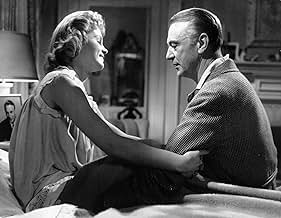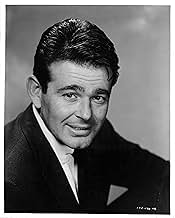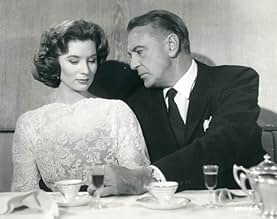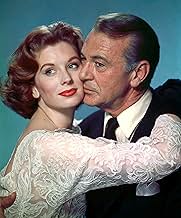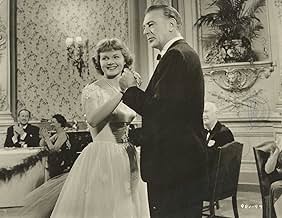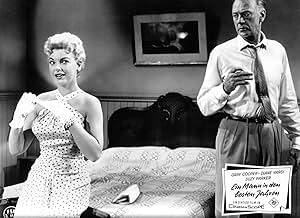PUNTUACIÓN EN IMDb
6,7/10
939
TU PUNTUACIÓN
En el funeral de su padre, Ann Chapin recuerda los últimos cinco años de su vida, años de aparente fracaso político y personal dominado por una esposa egoísta e insatisfecha y aliviados solo... Leer todoEn el funeral de su padre, Ann Chapin recuerda los últimos cinco años de su vida, años de aparente fracaso político y personal dominado por una esposa egoísta e insatisfecha y aliviados solo por el alcohol.En el funeral de su padre, Ann Chapin recuerda los últimos cinco años de su vida, años de aparente fracaso político y personal dominado por una esposa egoísta e insatisfecha y aliviados solo por el alcohol.
- Premios
- 1 premio y 1 nominación en total
Robert Adler
- Farmer
- (sin acreditar)
- …
John Alban
- Dinner Guest
- (sin acreditar)
Brandon Beach
- Dinner Guest
- (sin acreditar)
Melinda Byron
- Hope
- (sin acreditar)
Mary Carroll
- Nurse
- (sin acreditar)
Beulah Christian
- Nightclub Patron
- (sin acreditar)
Buck Class
- Bill
- (sin acreditar)
Reseñas destacadas
Gary Cooper made six films after "Ten North Frederick" -- and by the last one, "The Naked Edge," he was near death and filming had to be stopped frequently to give him oxygen.
Here, in a film based on a novel by John O'Hara, he plays Joseph Chapin, a lawyer with a son, Joby (Ray Stricklyn), a daughter,Ann (Diane Varsi) and an absolute shrew as a wife, Edith (Geraldine Fitzgerald). He's a gentle man, who has probably kept peace in his life by giving in to his wife.
The film begins with Joe's funeral, with his daughter Ann looking back on the last five years. Her own life has been affected by falling in love with a talented trumpet player (Stuart Whitman) and her ensuing unhappiness, and her brother wanted to study music at Juilliard but is pressured to attend law school. The war intervenes, and at the beginning of the film, he has returned for the funeral.
Edith has political ambitions and pushes Joe into throwing his hat in the ring; he soon finds it's too dirty a game for him and withdraws.
Joe, disillusioned, his beloved daughter having left home, he goes to New York to visit her and meets her gorgeous roommate (Suzy Parker). The two fall in love, despite their age difference.
I have to say, I felt the film was a little on the dull side - the pace was slow, and the acting, despite some of the comments here, I found rather dull. The thing about Gary Cooper is that he underplays and is very subtle - now, there's underplaying and there's just not acting. I have to say I didn't feel Diane Varsi did much acting here. Geraldine Fitzgerald was terrific, as was Ray Stricklyn, who went on to Broadway success and a huge career in publicity with the John Springer organization, handling people like Elizabeth Taylor and Bette Davis. Suzy Parker was always a total vision, but never much of an actress.
The most effective scenes were at the end of the movie, very beautiful and well worth waiting for. Cooper really shone throughout, but especially in the last section. A wonderful presence, and, like many stars of that era, we lost him too soon. It's sad to realize that they're all gone, including Varsi, who died at age 54.
Worth seeing for some of the performances. A little sharper direction would have brought it up a level.
Here, in a film based on a novel by John O'Hara, he plays Joseph Chapin, a lawyer with a son, Joby (Ray Stricklyn), a daughter,Ann (Diane Varsi) and an absolute shrew as a wife, Edith (Geraldine Fitzgerald). He's a gentle man, who has probably kept peace in his life by giving in to his wife.
The film begins with Joe's funeral, with his daughter Ann looking back on the last five years. Her own life has been affected by falling in love with a talented trumpet player (Stuart Whitman) and her ensuing unhappiness, and her brother wanted to study music at Juilliard but is pressured to attend law school. The war intervenes, and at the beginning of the film, he has returned for the funeral.
Edith has political ambitions and pushes Joe into throwing his hat in the ring; he soon finds it's too dirty a game for him and withdraws.
Joe, disillusioned, his beloved daughter having left home, he goes to New York to visit her and meets her gorgeous roommate (Suzy Parker). The two fall in love, despite their age difference.
I have to say, I felt the film was a little on the dull side - the pace was slow, and the acting, despite some of the comments here, I found rather dull. The thing about Gary Cooper is that he underplays and is very subtle - now, there's underplaying and there's just not acting. I have to say I didn't feel Diane Varsi did much acting here. Geraldine Fitzgerald was terrific, as was Ray Stricklyn, who went on to Broadway success and a huge career in publicity with the John Springer organization, handling people like Elizabeth Taylor and Bette Davis. Suzy Parker was always a total vision, but never much of an actress.
The most effective scenes were at the end of the movie, very beautiful and well worth waiting for. Cooper really shone throughout, but especially in the last section. A wonderful presence, and, like many stars of that era, we lost him too soon. It's sad to realize that they're all gone, including Varsi, who died at age 54.
Worth seeing for some of the performances. A little sharper direction would have brought it up a level.
About 15 years ago my daughter (about 13 at the time) and I were surfing channels and got in on the last 30 or 45 minutes of this movie. WOW, I had to own it and finally found it on VHS. A wonderful movie. One of my favorites of this genre.
And Gary Cooper had his own style. This was a bit unlike his other... But he played it to a T... Cooper was a gentleman, and his wife an overbearing witch. His failures result from his being too nice of a guy to make him into the man she wanted him to be. It was wonderful that his daughter found out that he had been happy. And even in that happiness he was still a gentleman.
And Gary Cooper had his own style. This was a bit unlike his other... But he played it to a T... Cooper was a gentleman, and his wife an overbearing witch. His failures result from his being too nice of a guy to make him into the man she wanted him to be. It was wonderful that his daughter found out that he had been happy. And even in that happiness he was still a gentleman.
John O'Hara's best selling novel, described by one critic as 'a brilliant portrait of the personal and political hypocrisy of mid-century America', has been adapted by one of cinema's finest screenplay writers Philip Dunne who also capably directs although he himself admitted that he had 'started directing too late'. Albeit truncated, this version apparently met with the approval of the author.
The political ambitions of leading character Joseph Chapin in the novel have been reduced here and Dunne has opted to develop a brief fling between middle-aged Chapin and Kate Drummond, a woman half his age, into a full blown romance. It must be said that the beautifully understated and sensitive playing of Gary Gooper and lovely Suzy Parker has resulted in one of the most moving and heartbreaking Spring/Autumn affairs ever committed to celluloid.
By all accounts Mr. Cooper jumped at the chance to play the part originally turned down by Spencer Tracy and would no doubt have identified with his character as he had earlier called off his relationship with Patricia Neal and returned to his wife who was hopefully more forgiving that his spouse in this, played by the superlative Geraldine Fitzgerald. There were also distinct echoes of Diane Varsi's own life in her role of Chapin's daughter, having come from a broken home and been twice divorced by the age of twenty one. This talented but fragile artiste suffered a breakdown during filming and was later to quit Fox studios as she felt she was 'heading for destruction'.
Great support from John Emery, Philip Ober, the ill-fated Tom Tully and the inimitable Barbara Nicholls as a party girl. There is a splendid score by Leigh Harline but the confounded Cinemascope format alas proves itself once again totally unsuited to intimacy. The phrase 'they don't make them like that anymore' is used to describe the character of Joe Chapin. It might just as easily refer to Gary Cooper.
The disillusionment, regret and sense of failure depicted here cannot fail to strike a chord with most of us and call to mind Whittier's 'Of all the sad words of tongue or pen, the saddest are these: it might have been.'
The political ambitions of leading character Joseph Chapin in the novel have been reduced here and Dunne has opted to develop a brief fling between middle-aged Chapin and Kate Drummond, a woman half his age, into a full blown romance. It must be said that the beautifully understated and sensitive playing of Gary Gooper and lovely Suzy Parker has resulted in one of the most moving and heartbreaking Spring/Autumn affairs ever committed to celluloid.
By all accounts Mr. Cooper jumped at the chance to play the part originally turned down by Spencer Tracy and would no doubt have identified with his character as he had earlier called off his relationship with Patricia Neal and returned to his wife who was hopefully more forgiving that his spouse in this, played by the superlative Geraldine Fitzgerald. There were also distinct echoes of Diane Varsi's own life in her role of Chapin's daughter, having come from a broken home and been twice divorced by the age of twenty one. This talented but fragile artiste suffered a breakdown during filming and was later to quit Fox studios as she felt she was 'heading for destruction'.
Great support from John Emery, Philip Ober, the ill-fated Tom Tully and the inimitable Barbara Nicholls as a party girl. There is a splendid score by Leigh Harline but the confounded Cinemascope format alas proves itself once again totally unsuited to intimacy. The phrase 'they don't make them like that anymore' is used to describe the character of Joe Chapin. It might just as easily refer to Gary Cooper.
The disillusionment, regret and sense of failure depicted here cannot fail to strike a chord with most of us and call to mind Whittier's 'Of all the sad words of tongue or pen, the saddest are these: it might have been.'
John O'Hara whose Pal Joey was brought to the screen the year before wrote the book Ten North Frederick on which this film is based. For some reason this is a film of Gary Cooper's that is rarely shown any more.
Cooper is the WASP type upper crust patrician who has some political ambition. He's a well respected man in his area, except apparently in his own home.
He's married to a woman who makes Lady MacBeth look like Mary Poppins. Geraldine Fitzgerald steals the acting honors in this film with her portrayal as the exponential shrew of a wife. Though I haven't seen Ten North Frederick in years, it's Fitzgerald's performance that has stayed with me and I suspect will stay with you if the film is ever going to see the light of day.
Diane Varsi and Ray Stricklyn are the rebellious kids in the household who can't quite figure out all the hostility there, but they not something is radically wrong. Suzy Parker plays Varsi's friend with whom Cooper has a midlife crisis affair with. Believe me when you see Fitzgerald in this film, you won't blame Cooper in the slightest.
Ten North Frederick set the standard for John O'Hara type soap operas and I'm surprised no one picked up on this one. With some updating this could easily be a plot for a prime time soap opera pilot.
Cooper is the WASP type upper crust patrician who has some political ambition. He's a well respected man in his area, except apparently in his own home.
He's married to a woman who makes Lady MacBeth look like Mary Poppins. Geraldine Fitzgerald steals the acting honors in this film with her portrayal as the exponential shrew of a wife. Though I haven't seen Ten North Frederick in years, it's Fitzgerald's performance that has stayed with me and I suspect will stay with you if the film is ever going to see the light of day.
Diane Varsi and Ray Stricklyn are the rebellious kids in the household who can't quite figure out all the hostility there, but they not something is radically wrong. Suzy Parker plays Varsi's friend with whom Cooper has a midlife crisis affair with. Believe me when you see Fitzgerald in this film, you won't blame Cooper in the slightest.
Ten North Frederick set the standard for John O'Hara type soap operas and I'm surprised no one picked up on this one. With some updating this could easily be a plot for a prime time soap opera pilot.
John O'Hara's book TEN NORTH FREDERICK was hardly the masterpiece of political life, but it had strong characterizations, and the film, also not a masterwork, has a lot more going for it than we initially thought. Still of major consequence are the performances of the supporting players. In this tale of a failed political hopeful, his vengeful wife, his youngish girlfriend, and assorted other characters, the viewer is caught by the superb work of the cast. All seems possible with the effective work. Geraldine Fitzgerald, as always, is a total marvel -- one of the finest of three decades. She should be almost deified. In this, she eschews her sensitive side to superbly capture the nastiness of a woman who want more and more... with less change to get it. But she is matched by young Ray Stricklyn as the confused young son... with at least one scene that should have done for him what the telephone scene in The Great Ziefgeld did for Luise Rainer. His work indicates the hope we all had for him.... but he correctly went to the L.A. stage where he scored enormous successes. Diane Varsi and Stuart Whitman both underscore the acting skills we first saw in them. The love story between the older Gary Cooper and the younger Suzy Parker works better than I had recalled. He tries with his expected skill to show the desperation of the man, but Suzy Parker DOES offer a multi-layered performance -- far superior to the work she had done in other films. This film remains an interesting Hollywood look at the world of politics, and it should not be buried unmarked in the annals of solid craftmanship.
¿Sabías que...?
- CuriosidadesSpencer Tracy was originally cast in the lead role, but withdrew due to ill health and concerns over the ability of co-star Suzy Parker. Tracy told reporters in November 1957 he had withdrawn from this film to star in El último hurra (1958).
- PifiasIn the bulk of the story, which begins and ends in 1945 and flashes back to 1940, all of the female clothing and hairstyles are strictly in the 1958 mode.
- Citas
Stella: You're hurtin' my arm.
Joseph B. 'Joe' Chapin: I frequently hurt people without meaning to. It's my specialty.
- ConexionesFeatured in El secreto de los Abbott (1997)
- Banda sonoraOn the Atchison, Topeka and the Santa Fe
(uncredited)
Music by Harry Warren
Played on the phonograph in Joby's room
Selecciones populares
Inicia sesión para calificar y añadir a tu lista para recibir recomendaciones personalizadas
Detalles
- Duración1 hora 42 minutos
- Color
- Mezcla de sonido
- Relación de aspecto
- 2.35 : 1
Contribuir a esta página
Sugerir un cambio o añadir el contenido que falta

Principal laguna de datos
What is the English language plot outline for 10, calle Frederick (1958)?
Responde
